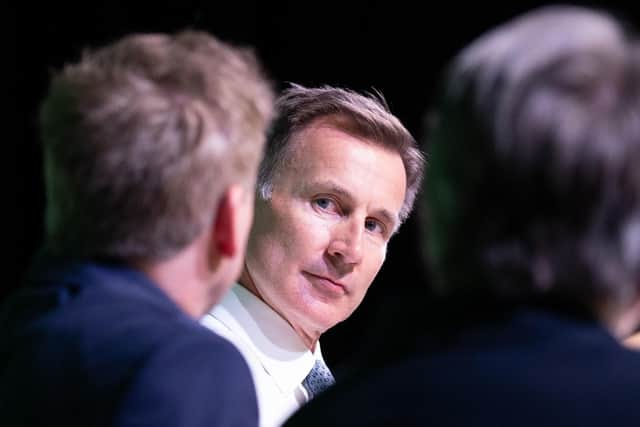No tax and spend plan despite improved finances, says Hunt
Data yesterday morning showed that the UK had a surplus of £5.4 billion in January, with borrowing around £30 billion lower than predicted.
This fiscal headroom comes as the Chancellor is under pressure to spend money on a variety of proposals in his Spring Budget on 15 March.
Advertisement
Hide AdAdvertisement
Hide AdMr Hunt and the Treasury are currently assessing calls to reform childcare and work-related benefits for the over-50s and the disabled to boost growth.


He has also been asked by Tory MPs and business groups for more substantial changes, such as scrapping the planned rise in corporation tax from 19 to 25 per cent.
Meanwhile the Federation of Small Businesses (FSB) yesterday warned that tens of thousands of companies will scale back investment if the Government presses ahead with plans to slash R&D support from small businesses, echoing similar calls from the CBI which asked the Chancellor to extend the “super deduction” tax break for businesses.
In addition the Government continues to grapple with trade unions which will continue to disrupt public services until an agreement is reached over worker pay, which for many sits far below the current rate of inflation of around 10 per cent.
Advertisement
Hide AdAdvertisement
Hide AdThe Resolution Foundation said the increase in funds will give the Chancellor the ability to further protect households from a spike in energy prices in April, when energy support is set to be less generous.
However Mr Hunt yesterday made a clear statement that the healthier economic outlook for the country did not mean that he would go down the route of major tax cuts and spending increases in the budget.
“Unfortunately, we don’t have that windfall,” he told reporters in London yesterday.
“Of course the fall in energy prices means the numbers are different to what they were two months ago, but unfortunately even though the cost of the [energy price guarantee] has gone down, so too have the windfall taxes that we were expecting to collect to pay for them.
Advertisement
Hide AdAdvertisement
Hide Ad“To make permanent changes in tax and spending that are recurring, year-in year-out, you need a more fundamental change in national finances, which I’m afraid we haven’t seen.”
His words were echoed by Downing Street, which warned that the prospect of tax cuts in the budget were unlikely as there was still “significant uncertainty and volatility”, and that borrowing still remains at record highs.
Mr Hunt also indicated that the extra room for spending in the budget would not be allocated to pay rises for striking workers.
“Pay rises are recurrent and they have a recurrent cost on the Exchequer, and what we see in today’s numbers is not a recurrent change in our national finances,” he said.
Advertisement
Hide AdAdvertisement
Hide AdIt came before a joint statement from the Department of Health and the Royal College of Nursing which said the two have agreed to enter a process of “intensive talks” in order to come to an agreement over a “fair and reasonable settlement” over pay.
This will see nurses pause their strike action while talks are ongoing.
Today will also see senior doctors and Government officials meet in order to discuss a way out of the pay dispute, with the British Medical Association (BMA) calling on Steve Barclay, the Health Secretary to get involved in disputes.
On Monday more than 36,000 junior doctors voted for industrial action in the largest eve4r turnout for a ballot of doctors by the BMA, and a record number of junior doctors voting for strike action.
Advertisement
Hide AdAdvertisement
Hide AdNew polling today finds that the public’s support for the Government’s handling of the NHS in England is the lowest for two decades, described as a “wake-up call” for Downing Street.
The research by Ipsos and the Health Foundation showed that only 10 per cent of people across the UK think the Government has the right policies for the NHS, falling to 8 per cent in England.
Tim Gardner, senior policy fellow at the Health Foundation, said: “If the government is committed to addressing the crisis in the NHS, it needs to produce a comprehensive plan, backed by sufficient investment, for getting the NHS and social care onto a more sustainable footing and urgently addressing workforce shortages.”